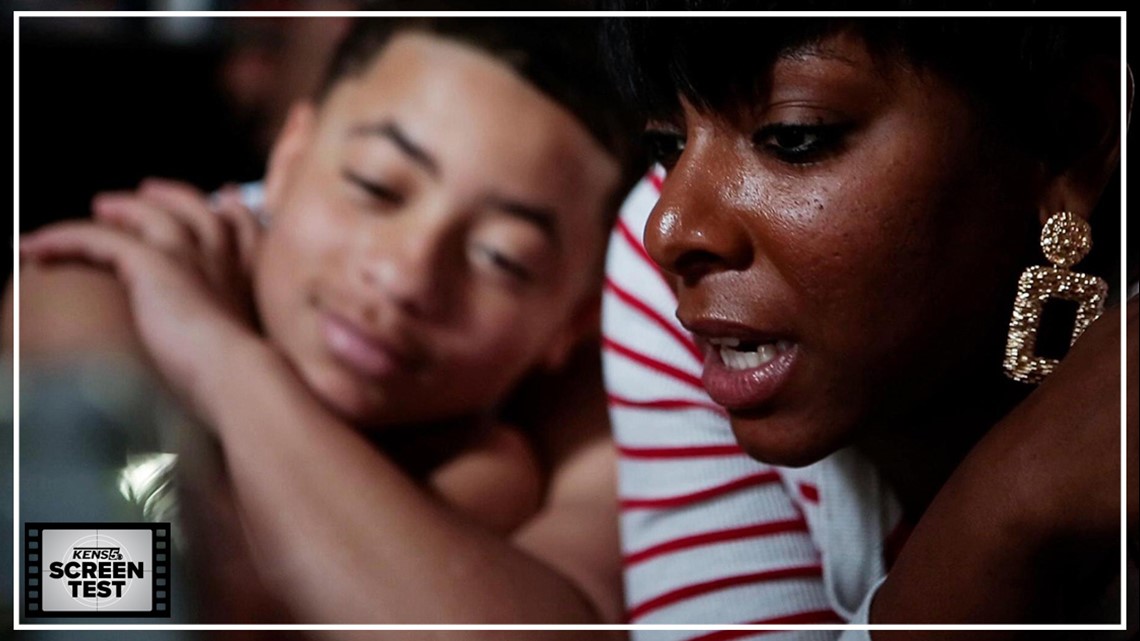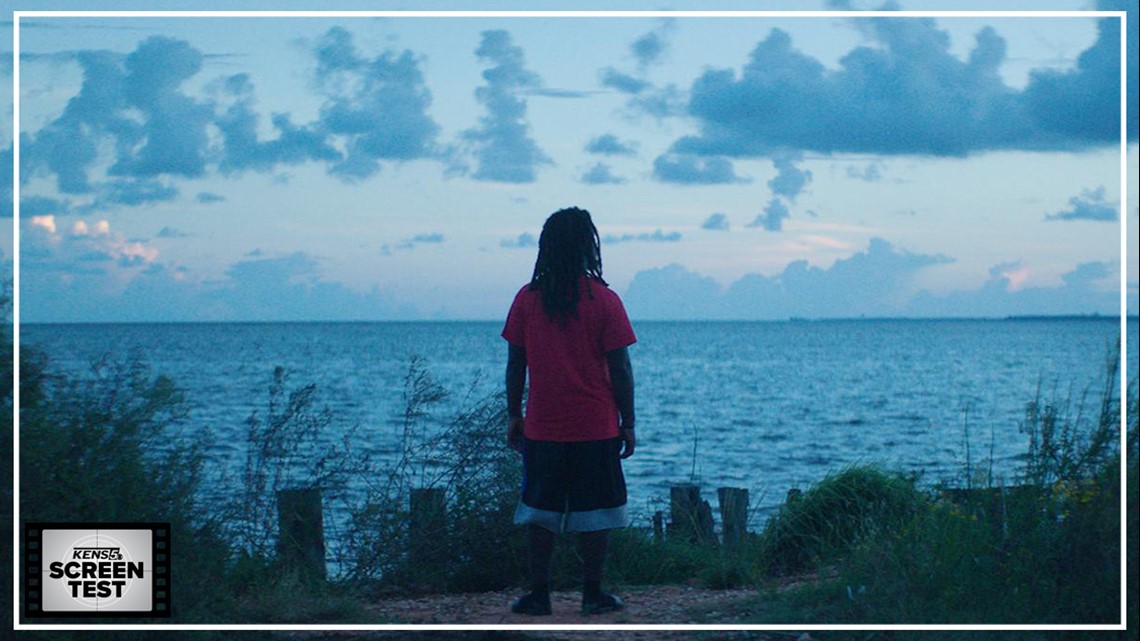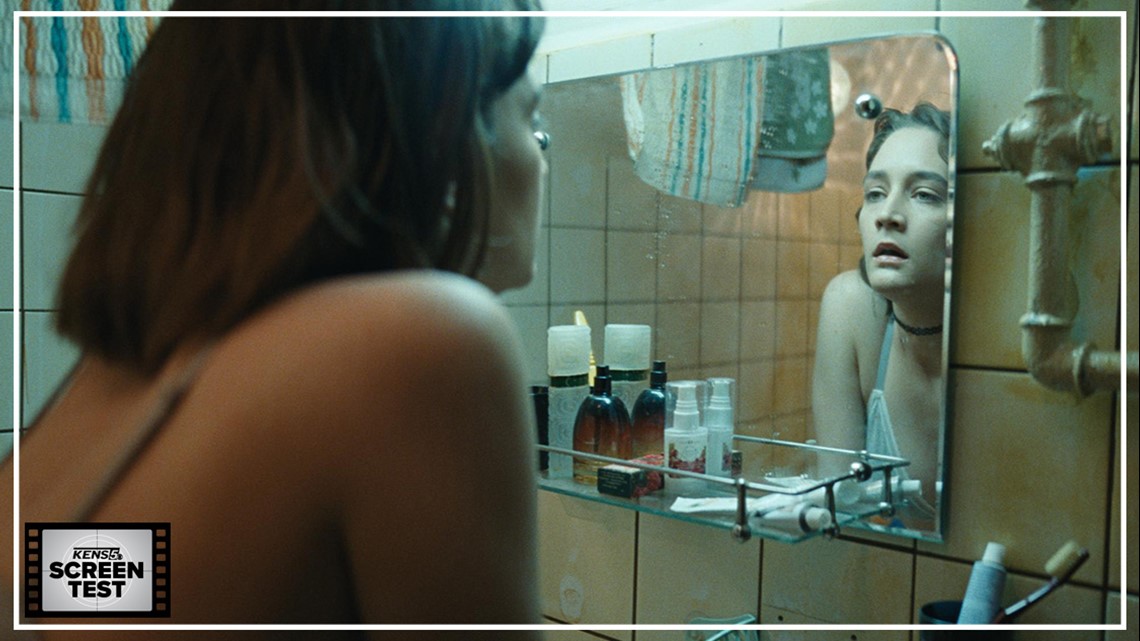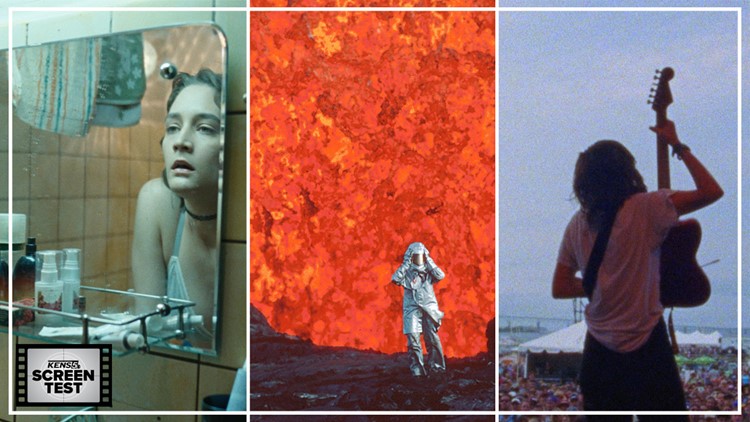SAN ANTONIO — Nestled amid the joyful chaos of the first in-person South by Southwest Film Festival in three years – the long lines, the coffee-chugging, the constant schedule-tweaking – was a documentary triple-feature I don’t expect to forget about anytime soon.
It kicked off with an invitation into the household of Asian-American filmmaker David Siev, whose stunningly raw documentary “Bad Axe” is named after his tiny Michigan hometown and also titled with an uncanny foreshadowing of the trials his family will face over the course of several early-pandemic months. It continued with “A Woman on the Outside,” a slightly more traditional – but no less moving – exploration by journalists Zara Katz and Lisa Riordan Seville into the burden of incarceration on Black women working to keep splintered families intact. And it culminated with “Self-Portrait,” a 56-minute catalog of ambient images captured from surveillance cameras which conjures something borderline profound from experimentation; it’s up to the viewer whether that “something” is forged from worldly beauty or humanity’s drive to have eyes anywhere and everywhere.
An afternoon like that practically ensures you’ll see the world a little differently when you exit the cinema as when you entered it. “Bad Axe,” “A Woman on the Outside” and “Self-Portrait” make for a trio of formidable arguments about the power of cinematic storytelling, and about giving yourself over to big-screen discovery. Venues and screening capacities may change at an event like the SXSW Film Festival, but the potential for movies to gift audiences new perspectives remains intact.


That gift can extend to filmmakers, too. Such is the case with “Marcel the Shell With Shoes On,” an easy-to-love charmer starring a tiny talking shell which originated as a web series over a decade ago. Operating at the intersection of family-friendly Pixar and the self-aware “Everything Is Alive” podcast, “Marcel the Shell With Shoes On” affirms many things – the rewards of curiosity, the mysteries of life, the singular personality of Jenny Slate – but above all it proves the big screen’s ability to grant massive new poignancy to the stories of characters we’ve met on far smaller ones.
Dean Fleischer-Camp’s movie has been acquired by A24, which almost certainly makes it the most purely innocent film to be distributed by the same folks who gave the world “Hereditary,” “Midsommar” and the new slasher throwback “X.” Its humor might be more effective than its earnestness, but even so it has major potential to take hold of mainstream audiences’ hearts if and when it’s released. The same potential resides with the stealthily subversive “Cha Cha Real Smooth,” the Texas premiere of which represented the culmination of a two-year journey for actor-writer-director Cooper Raiff.
It’s a story worthy of the movies: In 2020 the Dallas native’s remarkable debut, “Sh*thouse,” was a festival selection before the pandemic halted in-person SXSW events that year. Almost exactly two years later, his follow-up was selected for Sundance 2022 – also virtual, thanks to omicron – and won an audience award. “Cha Cha Real Smooth” was then selected for SXSW 2022’s Festival Favorites program, paving the way for Cooper to introduce his movie to a packed house in his home state Friday night.
The movie itself, enlisting an excellent Dakota Johnson and a spry charisma, is worthy of that real-life drama. It confirms Cooper’s knack for emotionally intelligent writing as he dials down on the sincerity of “Sh*thouse” while growing his narrative ambitions. “Cha Cha Real Smooth” is expected to be released by Apple TV+ in June.
Another festival highlight came courtesy of a more seasoned Texas director, Richard Linklater, whose “Apollo 10 ½: A Space Age Childhood” could only have premiered in the Lone Star State (before hitting Netflix on April 1). Colored with the bright nostalgia of growing up in humid Houston during the late-’60s and textured with Jack Black’s affectionate-sounding narration, “Apollo 10 ½” is the latest in a trend of pseudo-autobiographical movies from Hollywood auteurs. What sets it apart is its graceful blending of memory and history, as well as how the crisp beauty of its animation does wonders to create nostalgia for a more optimistic time.
It’s a small shame “Apollo 10 ½” will be most widely seen on TV screens. Then again, it’s a saving grace to know it’s likely to be the most widely seen Linklater movie since his “Boyhood” was nominated for Best Picture. Both movies manage to find profundity in simplicity.
Then there are movies like Colombian director Augusto Sandino’s “A Vanishing Fog,” which finds an ecologically minded spirituality in the inexplicable. The most impressive thing about this strangely lyrical film was how it viscerally unsettled my screening's audience (this critic included) despite not featuring a drop of blood or an ax-wielding menace. So potent are Sandino's ambiguities – we’re never quite sure what to make of the protagonist or his isolation – that it doesn’t really matter that I haven’t concluded whether the movie is actually good or not. Sometimes a movie just needs to linger in the mind, and linger in the mind “A Vanishing Fog” does. Almost more strongly than you’d like it to.
Those three aforementioned documentaries, meanwhile, were far from the only memorable ones. You’d do well to keep an eye out for the eventual Netflix release of “Descendant,” the chronicle of a recent search for the last known slave ship that serves as a vital examination about how closure for one person could represent the continued burden for another. Another pair of documentaries, “Until the Wheels Fall Off” and “Anonymous Club,” find their celebrity subjects – skateboarding legend Tony Hawk and Australian musician Courtney Barnett, respectively – at the crossroads of fame and personal wellbeing.


HBO Max subscribers will be able to watch “Until the Wheels Fall Off” on April 5; it’s a worthwhile education in how Hawk’s personal drive fueled his rise. But I was more engrossed with the approach of Danny Cohen’s “Anonymous Club,” which navigates Barnett’s shyness by structuring it around audio diaries she kept over a period of months. Her frankness – amounting at various points to candid reflection, confusion and catharsis – elevates Cohen’s movie far beyond the territory of standard rock documentary territory to something more raw and real.
If “Anonymous Club” formally hews itself to Barnett’s constantly searching mind, “Master of Light” shapes itself to the pensive grace of its subject, George Anthony Morton. It’s a triumphant festival selection, a documentary whose logline – a talented painter emerges from prison with newfound talent and creates portraits of relatives – belies a stunning elegance rarely glimpsed in the streaming era. Director Rosa Boesten proves herself an incredibly generous storyteller, tailoring “Master of Light” to Morton’s calm but consequential pursuit of rupturing centuries-old artistic status quos. The subject matter bears the weight of history, and Boesten is more than up to the task.
Indeed, nonfiction storytelling might have had a better showing at this year’s festival than the narrative offerings. Then again, if you were to ask this year’s festival-goers about the one selection that most exuberantly showcases cinema’s infinite potential, most won’t have to think very long on it—not when Daniels’ “Everything Everywhere All At Once” ushered the opening-night audience through multiversal chaos with endless glee and invention. The directors of “Swiss Army Man,” a drama about a farting corpse played by Daniel Radcliffe, make that movie look tame with their follow-up, which works through its flaws with sheer commitment, surreal flair and one incredible lead performance from Michelle Yeoh.
“Everything Everywhere All At Once” comes out soon; see it with an audience. Wait a few weeks and you might even consider making a double-billing out of the sci-fi/fantasy adventure and the upcoming comedy “The Unbearable Weight of Massive Talent,” starring Nicolas Cage at his most self-aware (as in, he plays himself). Rest assured the movie is far more effective – far more engaging, hilarious and celebratory – than its marketing suggests. At the very least, it revives the potential of the bromance; Cage and Pedro Pascal, playing his No. 1 fan in the movie, make for an incredible on-screen pairing.
Those two movies were backed by studios, anchored by A-list talent and imbued with an infectiously kinetic energy. None of that can be said for “Nika,” an immensely involving character study from Russian director Vasilisa Kuzmina, and yet it's the best dramatic movie I watched at SXSW this year. Unfolding with a wry sense of humor and the master-level confidence to let scenes breathe and take on lives of their own, the best reason to see “Nika” is Elizaveta Yankovskaya’s dynamite debut turn. It’s a performance of such volatile, Elisabeth Moss-esque unpredictability that it’s a wonder “Nika” manages to keep the young actress in the frame during this story, one inspired by the life of real-life child poet phenom Nika Turbina.
"Nika" is funny, romantic and caustic, turning the familiar conceit of artistic pursuit on its head in a manner that recalls the intense emotions of Eliza Hittman and the just-verging-on-fantastical storytelling of Alice Rohrwacher. Who knows if a general U.S. release will be the fate of “Nika.” It’s my sincere hope that it is.


Luckily, no such doubt clouds the future of Sara Dosa’s astounding “Fire of Love,” a documentary that doesn’t merely benefit from utilizing the most incredible volcano footage ever gathered but is passionately inspired by it. Acquired by National Geographic Documentary Films after Sundance in January, “Fire of Love” is expected to be released in theaters sometime in the coming months—and the theater is where Dosa’s movie, equal parts romance, myth and education into history’s most daring volcanologist duo, deserves to be seen.
Like “Master of Light,” “Fire of Love” challenges traditional ideas of what documentaries can aspire to, making the worthy case that emotional mystery is just as valuable as statistical truth. Its images are marvelous to watch, and the style it braids them together with is as captivating as the eruptions Maurice and Katia Krafft captured.
In that sense, "Fire of Love" is a most appropriate representative for the best films to screen at SXSW this year—bold, dynamic, exciting and enriching.
---
MORE SXSW FILM FESTIVAL COVERAGE:
- 'Love will ultimately, hopefully, overcome the bad': David Siev on his raw, pandemic-era documentary 'Bad Axe'
- ‘Fire of Love’ director Sara Dosa on crafting the story, and myth, of history’s boldest volcanologists
- SXSW: Performance-powered ‘The Lost City’ marks an enjoyable return for bigger-budget comedies
- SXSW: Filmmaker Iliana Sosa on crafting a memory piece about her grandfather in the documentary ‘What We Leave Behind’
- SXSW: Tony Hawk faces a reckoning in new doc ‘Until the Wheels Fall Off’
- SXSW: Multiversal madness reaches boundless new highs in Michelle Yeoh-led ‘Everything Everywhere All At Once’



